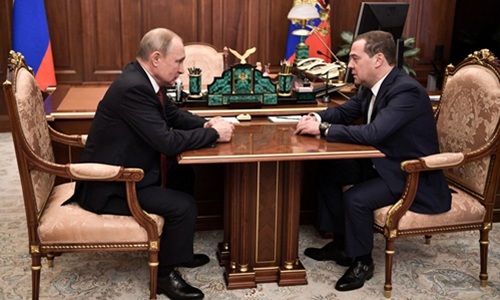HOME >> OPINION
Reforms dictate Russian president’s move to change PM
By Li Yonghui Source:Global Times Published: 2020/1/19 18:08:41

Russian President Vladimir Putin meets with Prime Minister Dmitry Medvedev in Moscow on Wednesday. Photo: AFP
Shortly after Russian President Vladimir Putin delivered his annual state-of-the-nation address to the Federal Assembly Wednesday in Moscow, Prime Minister Dmitry Medvedev announced that the entire Russian government was resigning. And a new prime minister - Mikhail Mishustin, head of the country's tax service, was nominated by Putin.Although one that took the world by surprise, it was not a reckless decision, but a result of deliberation. Two purposes can be gleaned from Putin's move.
First, Putin was preparing for constitutional reforms and expecting a more balanced power structure. In his speech, he said he will dilute the president's powers, and "increase the role and importance of the State Duma and parliamentary parties as well as the independence and responsibility of the prime minister."
After broad amendments to the Constitution are adopted, "there will be significant changes not only to a variety of Constitution articles, but to the balance of power, namely to the executive, legislative and judicial branches of power," said Medvedev.
Based on the current Constitution of Russia, the president is at the apex of its power. Dominating the country's politics for two decades, Putin has always been the nucleus. Hence, after his period in office ends in 2024, it is likely that a struggle for power in Russia's political circles will take place. Putin would be worried about the potential scramble, and concerned that if his successor becomes too powerful, the stability of Russian politics will be endangered.
Second, Putin hopes to boost the flagging Russian economy. It is worth noting that the president's speech to the Federal Assembly was delivered at the very beginning of the year, much earlier than in previous years. The reason, according to Putin, is that Russia needs to "address large-scale social, economic and technological tasks facing the country, more quickly and without delay."
Economic tasks are undoubtedly the most urgent and challenging ones. The country's economy has been turbulent in recent years. Only when economic growth is stimulated, can economic strength be increased, and people's livelihood improved, so that Putin can win back prestige and support and the smooth transition of power ensured in 2024.
One of the major responsibilities of a country's government is to promote the domestic economy. Russia's unexpected political changes have to some extent reflected the poor governance of Medvedev's government. Putin may hope that a new government along with new environment brought about by the changes will help stimulate the economy. The sooner a new government is formed and officials appointed, the sooner Russia will be able to implement its development strategy to lift the economy out of the doldrums and change people's livelihood including education, culture, and healthcare.
In addition, domestic resentment caused by corruption and people's low income levels is a thorny issue in Russia. It is hoped that the new government can make efforts to resolve these problems.
The changes in Russian politics have mainly targeted the country's domestic problems and would have little impact on its foreign policy. In the near future, Moscow is likely to stick to its established diplomatic strategy in a bid to create a stable environment for development.
It can be seen that Russia will continue its efforts to mend ties with Western countries. Although it is the West that now holds the initiative, Russia can still adopt a conciliatory approach. In terms of partnership with China, Russia will maintain friendship and cooperation with its East Asian neighbor. Relations between the two great powers will not waver easily.
The author is a research fellow in the Institute of Russia, Eastern European and Central Asian Studies at the Chinese Academy of Social Sciences. opinion@globaltimes.com.cn
Posted in: VIEWPOINT